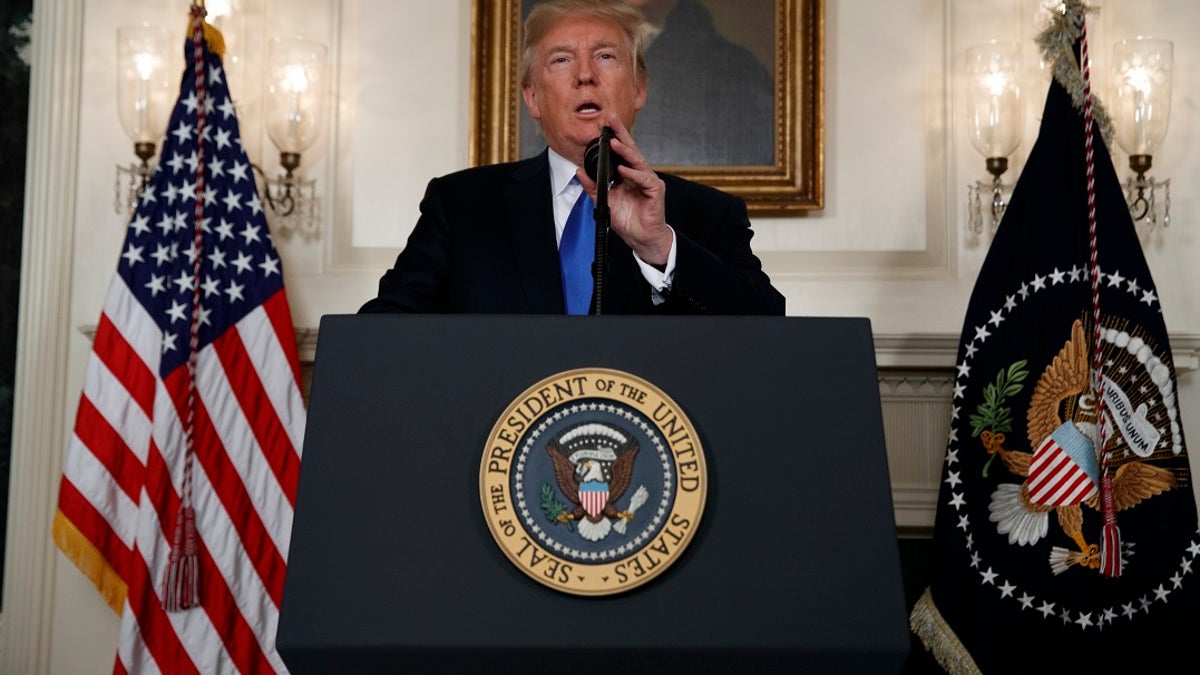
Politicians reacted to President Trump’s decision to decertify the Iran nuclear deal. (AP)
The Trump Show continues to monopolize our national stage. This past week, Bob Corker, a sitting U.S. Senator, called the White House a home for an addled geriatric, and accused the president of castrating Rex Tillerson, his Secretary of State. Meanwhile, Steve Bannon, Trump’s campaign guru and former senior White House advisor, bet against Trump finishing out his first term, as the head of Breitbart fixed his gaze on the Twenty Fifth Amendment to the U.S. Constitution. Over in the realm of policy, Trump declared war on ObamaCare, the Iran Deal, the First Amendment and UNESCO. As long as Trump occupies 1600 Pennsylvania Avenue, don’t expect this tumultuous cacophony to disappear. It is America’s new normal.
Enter “One Nation After Trump: A Guide for the Perplexed, the Disillusioned, the Desperate, and the Not-Yet Deported,” a 352-page prayer and how-to book, written by three members of the D.C. establishment, E.J. Dionne of the Washington Post, Norman Ornstein of the Brookings Institute, and Thomas Mann of the Brookings Institute. “One Nation After Trump” offers a sincere and detailed blueprint for a neo-liberal restoration. And that is its problem. The book fails to adequately internalize the rage that in 2016 overturned America’s post-Reagan status quo. Beyond that, the authors seemingly fail to recognize that politics is transactional, and lack a message and offering powerful enough to lure Obama-Trump voters back to the Democratic column. Most of all, there is an empathy shortage for those who find themselves outside of the Democrats’ current upstairs-downstairs coalition.

As Paul Begala, a Democratic strategist and former advisor to President Bill Clinton, trenchantly framed things, “If the life expectancy of, say, Somali immigrants in Minnesota suddenly took a dive, Democrats would be falling all over each other trying to ascertain the causes and advocate the cures. We owe white working-class Americans no less.”
The book fails to adequately internalize the rage that in 2016 overturned America’s post-Reagan status quo.
Yet, “One Nation” does not come close, even as it awkwardly tries. The book contains a detailed discussion of America’s changing demographics, its historic high levels of immigration, and the resulting friction and resentment. A significant portion of Trump voters feels like strangers in their house, and “One Nation” does not satisfactorily address that disconnect. Rather, its authors seems intent on pushing ahead with a prescription of open borders and multiculturalism, the same recipe that made Trump a reality. This approach may sound like sweet music to the chattering class, but is unlikely to impress those voters who cast a ballot for Barack Obama in 2008 or 2012 and then for Donald Trump a year ago.
The glaring realities are also that at the end of the day 700,000 white employees lost their jobs as the result of the Great Recession, that white life expectancy outside the reach of high-end America has declined, and that with the exceptions of Maine and Vermont military service is the domain of Red America. As Andrew Sullivan observed in New York Magazine, in recent years the number of deaths attributable to drug overdoses exceeds the annual death rate from AIDS. However, no one is wearing ribbons. The powder that exploded last November was all around.
At the same time, polling from Gallup had reflected a pre-election groundswell in Americans’ self-identification as working class. At the turn of the century, only one-third of Americans identified themselves as such. Yet by 2015, the figure had risen to nearly one-half. Fortunately, the number of Americans who see themselves as working class has since receded to pre-recession levels, with only 36 percent calling themselves working class as of June 2017. As the scholar, Barrington Moore Jr., said, “No bourgeoisie, no democracy.”
“One Nation” is on more solid ground in identifying the threat that the Trump presidency represents to American norms and institutions. Hardly a day goes by without Trump taking aim at both. An independent judiciary, a functioning diplomatic corps, and a free press have all been Trump targets. Yet, Trump’s core supporters are either undisturbed or are actively rooting for their guy. Clearly, “modern” presidential has more than a few followers.
Against this backdrop, it looks like Dionne, Ornstein, and Mann, “One Nation’s” authors, have a lot of persuading to do. Whether they are simply preaching to the choir, or leave a real mark remains to be seen.
Lloyd Green is the managing member of Ospreylytics, LLC, a research and analytics firm, was staff secretary to George H.W. Bush’s 1988 campaign’s Middle East policy group, and served in the Department of Justice between 1990 and 1992.




















